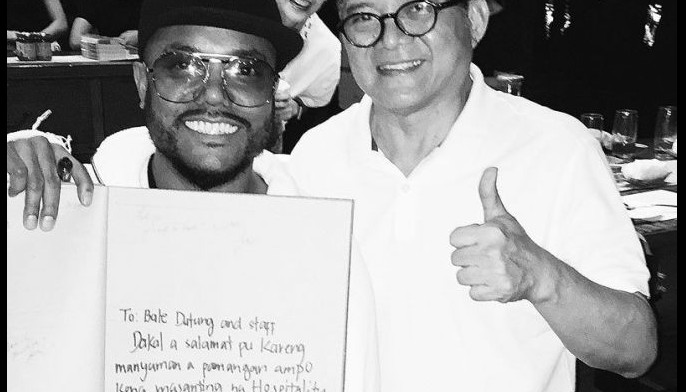Fil-Am designs US humanities medal
ROUND LAKE, Illinois – With only $5 in his packet, Paul Cainto Balan was reluctant to come to America because he did not want to leave a fledging commercial art business in his hometown of Paete, Laguna.
But his wife Marra prevailed upon him to leave his art instruments behind to start a new life in a distant land.
Last July 28, Balan lived the American dream when President Barack Obama conferred the National Humanities Medal – which Balan designed – on ten outstanding Americans during a ceremony in the White House in Washington.
“Never in my wildest imagination did I think that I would be invited to the White House to witness a ceremony that would feature my work. I only have to thank God and my wife for encouraging me to come to America,” a teary-eyed Balan said.
Balan, 41, designed the gold-plated medal that shows Lady Liberty in a diadem and flowing dress. The pre-Raphaelite image has her surrounded by a sheaf of wheat, a dove and a lamp.
Balan, now a US citizen, won a $3,000 prize in a design competition sponsored by the National Endowment for the Humanities that attracted 131 entries, including two from Balan.
In 2010, the US Mint accepted Balan in its Artistic Infusion Program as one of 19 artists who help design coins and commemorative medals.
For the Mint, he has designed two congressional medals honoring Native American “code talkers” and one side of a coin for the US Marshals Service’s 225th anniversary.
He receives $2,500 for each design assignment and another $5,000 if the Treasury Department uses his design for a coin or medal (both sides of the coin), Mint spokesman Mike White was quoted by the Chicago Tribune as explaining.
Although his work on the side prompted him to take a sabbatical from his mailroom work at CDW at Vernon Hills, Illinois last year, his 14-year contract with the US Mint to design coins or medals was a job offer he could not refuse. This prompted him to give up his job at CDW recently, according to Marra, who also works at CDW as customer relations service employee.
There were lots of hugging, kissing and well wishing when he left his job after 14 years, Paul said. A co-employee told him his accomplishments brought honor to Filipinos.
Paul is also grateful to his employer whose vice president Max Reed encouraged him to pursue his passion. “I heard my CEO shed a tear when I won the design of the National Endowment for the Humanities medal,” he said.
The CDW even nominated him as one of the 500 Heroes from Fortune 500 companies, joining another Filipino who was featured for saving two boys from drowning. Angelo Ramos is a campaign sales executive of Monsanto Company in Cauayan City, Isabela in the Philippines. The award is given to “Fortune 500 workers who, unknown to even many of their colleagues, have performed remarkable acts of goodness.”
Balan grew up in Paete, which is known for woodcarving. His maternal great-grandfather, Pablo Bague, was a sculptor. His parents crafted wood furniture and chess sets to raise their family of five.
While growing up, Balan copied images of his grandmother’s stampeta (prayer cards) and other images from the encyclopedia. He used a ballpoint pen in his drawings and coffee grounds as his watercolor to paint. He stretched denim onto a wooden frame and rendered it white with household paint he bought from Manila.
To support himself, he painted religious murals and began designing stained glass for churches. He attended commercial arts classes at the University of Sto. Tomas for two years but failed to get a diploma for lacking units in ROTC and PE.
When he flew to Chicago in 2000, his wife’s grandmother gave him a $5 bill. “That’s the only money I had,” he said.
In Chicago, his wife Marra was the provider for the family for several months and he felt bad that he could not be the breadwinner. This made him uncomfortable to resume his painting career since there is no security of income.
He first worked as a waiter and found an entry-level job with his wife’s employer, CDW, in 2001. When he got a regular paycheck, Paul started buying art supplies so he could resume painting and sculpting when he was off-duty. He started painting jobs for churches and private homes to augment his income. When he sculpted the San Lorenzo Ruiz statute in 2009, he was paid $7,000.
To keep up with his peers, he joined art exhibits, some of them sponsored by the Philippine consulate during the Philippine Independence Day celebrations in Chicago, and other arts competitions. He said in one of these exhibits, a former artist from the Philippines told him that when he came to the US, he threw away his art and looked for other jobs. “Now that I saw you succeed, I will try to buy art supplies and go back to my painting again.” He said he was glad he was able to “inspire another artist to return to an old love.”
One of his prized works that took him a year to finish was the depiction of the Philippine national anthem Lupang Hinirang, sketched on ten 18-by-24-inch panels.
- Latest























